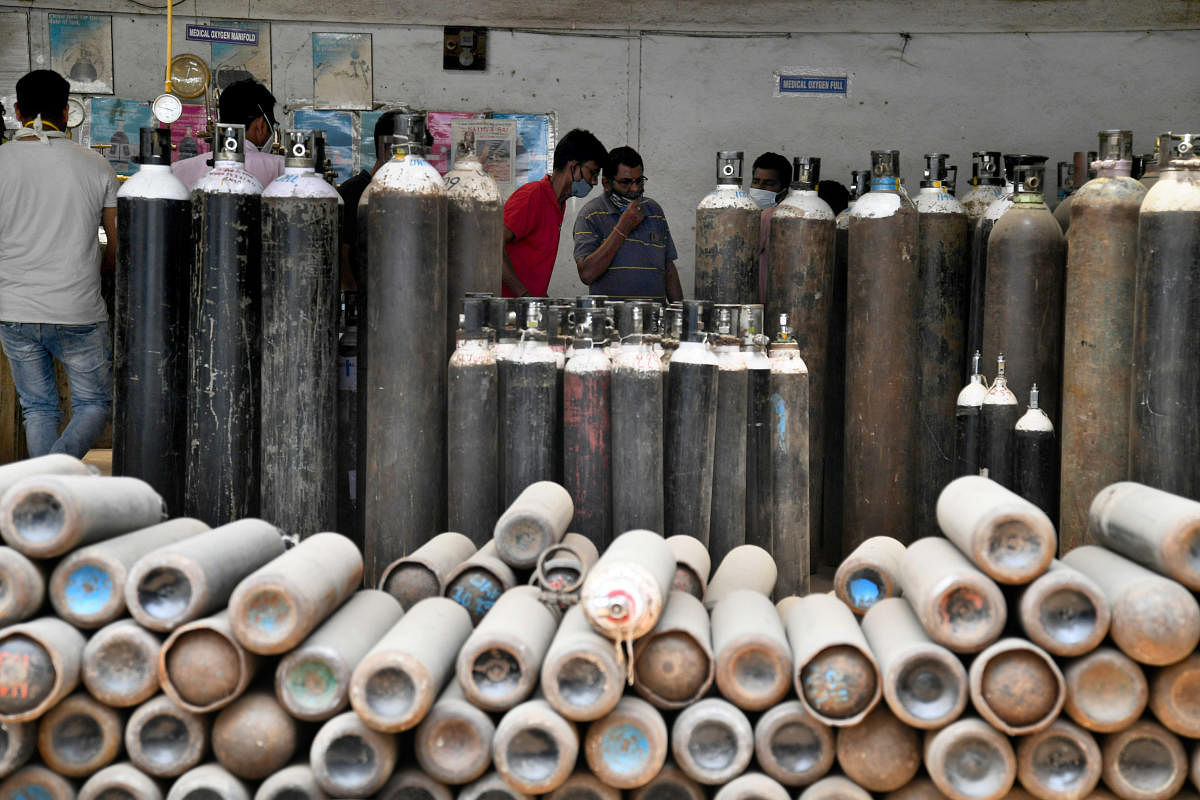
The Karnataka government has directed oxygen plants to not refill cylinders brought in by individuals. Signed by P Ravi Kumar, chief secretary, the order dated May 9 says it is important to "keep an inventory of healthcare resources and use them judiciously" in the wake of the second wave.
Karnataka has a daily allocation of 965 MT of liquid medical oxygen (LMO) from the central government, while the demand has been assessed at 1500 MT per day, the circular notes.
"Therefore, there is a need to have efficient, transparent and comprehensive guidelines for management and distribution of the Medical Oxygen at all levels and until the last mile," it reads.
As of May 11, the centre had issued a new plan allocating 1015 MT to Karnataka. However, it still falls short of the state's requirements.
The circular says the main reason for hospitals running out of oxygen is that the "oxygen supply quantities have not increased but the hospitals in the districts and BBMP are increasing their consumption beyond supplies by increasing oxygenated beds." It describes this model of consumption as "unsustainable".
Under these new guidelines, nodal officers for production, transportation and distribution of medical oxygen have been appointed and a 24x7 oxygen helpline set up at the drug controller’s head office in Bengaluru.
The BBMP has also been directed to set up zonal oxygen cells in all its eight zones, to be functional 24x7, but they are not functional yet.
Groups working to help Covid patients in distress find one of the directives contentious: "The re-fillers or manufacturers shall not supply medical oxygen to individual persons and all medical oxygen supplies shall be only to the hospitals."
The order adversely impacts oxygen-dependent patients in home isolation, they say.
‘Only trying to help’
Entrepreneur and social worker Yetish Babu bought three cylinders — two for his family and one for friends — following the advice of doctor-friends.
“My father was positive during the last wave. I live in a joint family, so when the second wave came, they advised me to keep cylinders in stock,” he says.
His family has remained safe, and he has been giving the cylinders out for free to those in need. “I have my own vehicle, so I take care of pick up and drop off,” he says.
Over the past couple of weeks, he had been circulating 18 cylinders received from donors and was able to help about 200 patients.
The new order makes it impossible for him to continue his work. “I just don’t understand. We are reducing the burden on the government, even if we are helping small numbers,” he says.
Babu, who lives in Malleswaram, travels to Peenya, Jigani Industrial Area, Dabaspet, and Kanakapura Road to refill cylinders. “I have to beg them and then drop the cylinders off at the patients’ houses. I have been trying to get some kind of letter from officials, but no one is helping,” he says.
No communication
Oxygen plants are unable to help because of strict orders from the BBMP, says Rohith, involved in relief efforts since the start of the second wave.
“I was to get 500 cylinders tomorrow, airlifted from China, to be distributed for free. Now I have to redirect it to another city,” he says.
To save their loved ones, many people bought cylinders on the black market. That money will now go waste, he says.
Policemen on the roads are checking vehicles carrying cylinders. “People are being interrogated. There have been instances of confiscation. It has become so difficult for volunteers trying to keep someone alive,” he says.
Telling people to go to the hospital is not a solution as not enough oxygen beds are available, he observes. “People are helpless as those at home have not been offered any alternatives,” he says.
Something as simple as allowing one NGO to be a point of contact for home-isolating patients would go a long way in easing the stress of trying to find oxygen, say volunteers.
Pass the oxygen
Freeda Lazar, Arshiya Sayed and Jayanth Nagraj, started an initiative, ‘Pass the Oxygen’ to make oxygen accessible and affordable.
They have been asking people to donate used and half-used cylinders so that they can be refilled and passed on to someone in need. They have also created a database of cylinders, and they update it frequently.
They collect a refundable deposit of Rs 5,000. They have four cylinders in rotation and have been raising funds to buy four more.
“We have realised that the government cannot shut down supply completely. There are people, for example, the differently-abled, who need oxygen for other requirements,” Arshiya says.
The government is simply trying to prevent overcharging but it should also use the opportunity to work with voluntary networks, she says.
As of now, a few suppliers give you oxygen if you show a prescription, which wasn’t required earlier.
“The government also doesn’t want people to get admitted at hospitals. A lot of cases are being handled at home,” she says.
Oxygen helpline
Metrolife called the helpline number - 89517-55722 (run by the drug controller's office). They picked up on the third try. The person who picked up the call informed us that they only provide oxygen supply for hospitals.
(An earlier version of this story was posted on May 14. This is revised and updated with the latest numbers.)